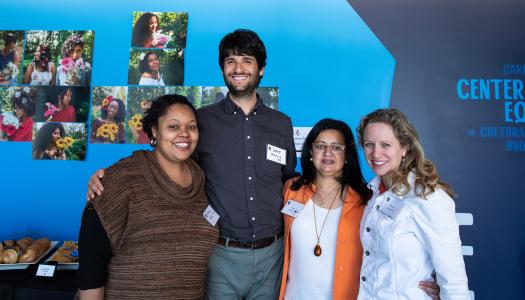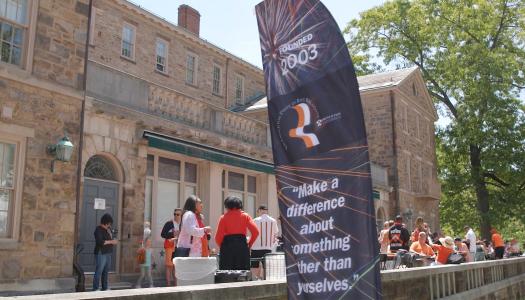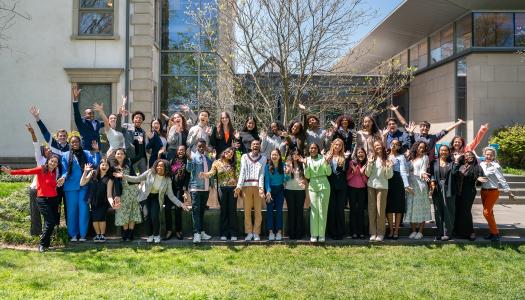Selah Hampton ’18 is helping the next generation create lasting change in their communities
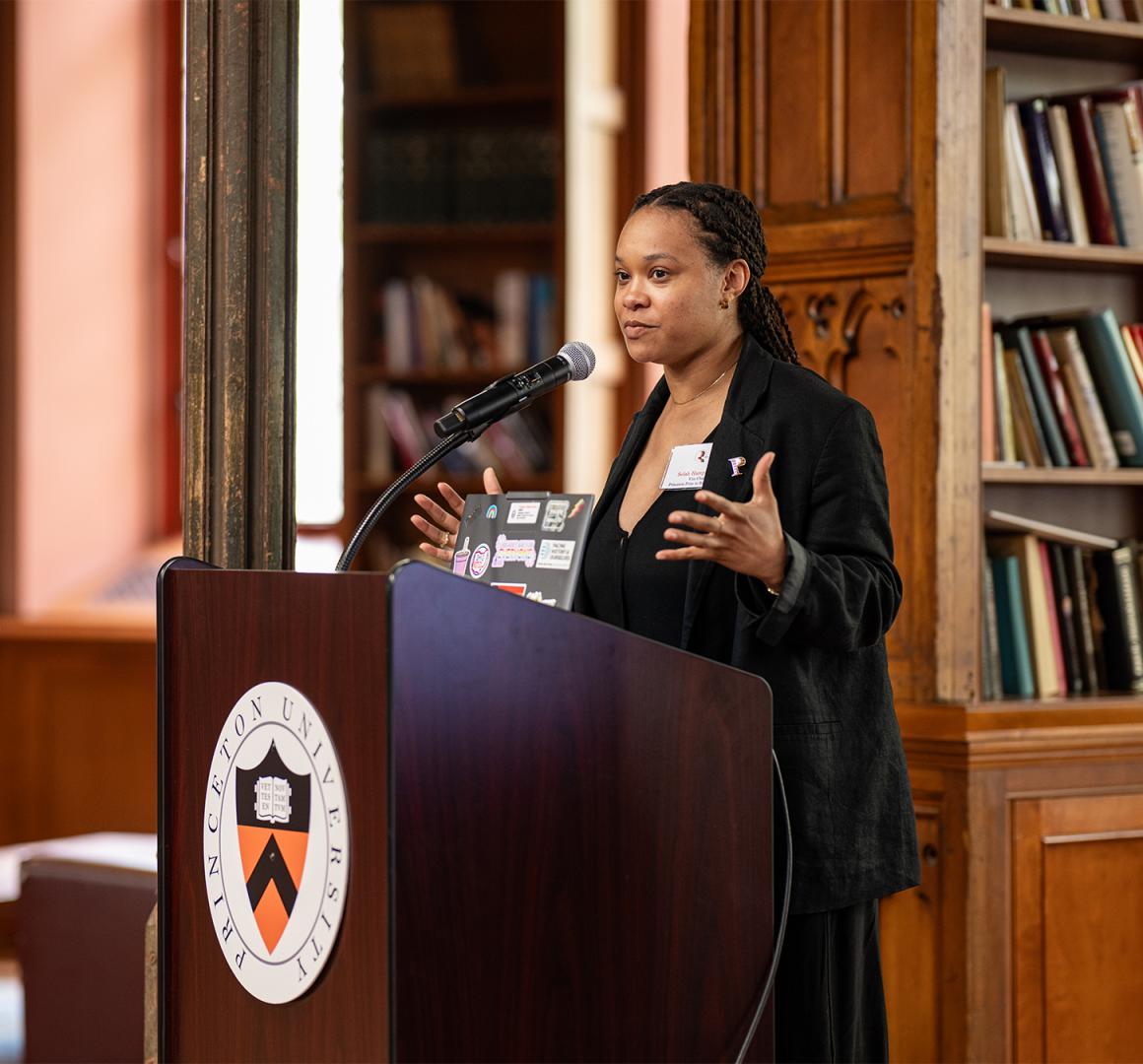
Photos by Sameer Khan
Through the Princeton Prize in Race Relations (PPRR), a Princeton University initiative that recognizes young people across the U.S. who work to advance racial equity in their communities, Selah Hampton ’18 has connected with generations of change-makers.
Shortly after graduating, Hampton began volunteering with the PPRR committee in New York City. Among her fellow volunteers was Annette Liberson-Drewry, former teacher and director of the Walden School, who brought with her decades of experience with independent schools in New York City. Liberson-Drewry’s late husband, Henry Drewry, was a trailblazing Black administrator at Princeton. Henry directed the University’s teacher preparation program for two decades starting in 1968 and taught its first course in Black history and culture.
Now in her 90s, Liberson-Drewry has remained engaged with the University. “Many years after Henry’s passing, Annette has continued to be involved in our [PPRR] program,” Hampton said. PPRR volunteer activities include promoting the prize in high schools, reviewing applicants’ projects, selecting the winners and celebrating their accomplishments.
As the chair of the PPRR Advisory Council, Hampton continues to draw inspiration from Liberson-Drewry. “I visit her for lunch monthly,” she said. “She has served on our Regional Affairs committee with the Advisory Council and continues to bring fresh energy to everything we do.”
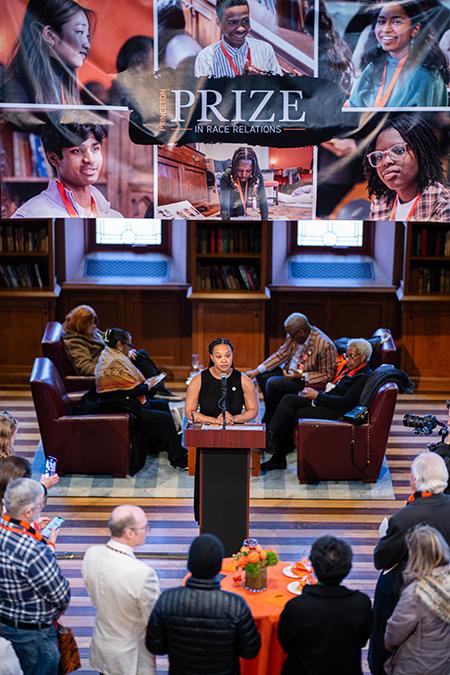
Hampton’s path to becoming a dedicated Princeton volunteer wasn’t always straightforward. She came to Princeton in 2013, after a chance conversation with her high school friend, Ogemdi Ude ’16, about one of the University’s student dance companies. “It was a no-brainer,” she said. “I had the dance community that was really beckoning and burgeoning and such great financial support.”
But in 2014, Hampton was heading into her sophomore year at Princeton as the events in Ferguson, Missouri, unfolded. Over the summer, a white police officer had shot and killed Michael Brown, an unarmed Black teenager, sparking outrage and setting off more than a year of protest in and around the area. The national conversation about race and police brutality that helped launch the Black Lives Matter protest movement rippled through the University, magnified by incidents on campus and anonymous postings on the now-defunct Yik Yak discussion app.
“I love learning, I love school,” Hampton said, “and it got to a point where the day-to-day reality of being on campus made it difficult to focus on academics.”
The challenges of that time led Hampton to take a year off after her sophomore year. When she returned, she immersed herself in her studies and in the diSiac Dance Company, one of Princeton’s premier dance groups, eventually becoming artistic director her senior year. “I ‘majored’ in dance at Princeton, even though that’s not possible,” she said. “But I did spend most of my time outside the classroom in a dance studio.”
Rather than allowing the upheaval of her sophomore year to negatively impact her connection with Princeton, Hampton used the experience to fuel her commitment to change by becoming a Princeton Prize volunteer shortly after graduating in 2018. “It will never be lost on me that I’m a product of the University and that there have been so many positive things and advantages that have come to me because of that educational opportunity,” she said. “I take it as my personal duty to try and make it a better place than it was when I was there.”
Established in 2003, the Princeton Prize celebrates the accomplishments of young people (more than 2,000 honorees so far) who have demonstrated leadership in advancing racial equity, promoting racial understanding, or eliminating racial bias and prejudice in their schools and communities. Prize recipients receive an award of $2,500 and an all-expenses-paid trip to campus for the Princeton Prize Symposium on Race in the spring. Recipient projects range from creating the first cultural affinity groups in schools to founding 501(c)(3) nonprofit organizations dedicated to challenging the discrimination and inaccessibility issues that perpetuate health inequities.
“My favorite time of year is when we pull up the applications and read them,” she said. “I get so emotional and I’m like, ‘How are they doing this? They’re 17 and they’re presenting to city council, they’re raising money.’”
For example, she notes that one of last year’s winners persuaded the town of Malverne in Long Island to rename a street that had been named after a Ku Klux Klan leader: “It took years to push through the change, but they got it renamed to Acorn Way because there was an elementary school on the street.”
Over two decades, the Princeton Prize has grown from five to 28 regional committees that include more than 400 Princeton alumni volunteers around the country. Hampton’s involvement with the program has evolved from volunteer to regional co-chair to national vice chair and now chair of the national committee. She leads the program while maintaining a demanding career in transit technology and performing as a professional dancer in New York City. “It’s a delicate dance of keeping all the balls in the air at once, but it is very fulfilling,” she said.
PPRR’s alumni volunteer leadership, working in concert with the University’s alumni engagement team, is implementing a new vision for the program’s future, including expanding its reach, diversifying its volunteer base and creating a network of past winners. “While I was vice chair, then-chair Steve Marcus ’10 was clerking for Justice Sotomayor and just had a child and was the first person to respond to every email while taking us through this large organizational change,” she said. “He serves as my inspiration for what it means to show up in the places that need our time and attention.”
When she’s not managing transit systems across the East Coast or rehearsing for the show at New York Live Arts that she and Ude will premier in November, Hampton is focused on finding ways to amplify the stories of Princeton Prize winners past and present.
“I aspire to give everyone the feeling I get when I read those applications,” she said. “The inspiration from these students is so palpable.”
Hampton also feels a strong responsibility to help guide and support the Princeton Prize winners when they visit campus for the annual Symposium on Race. “Given the emotionally tolling work of activism, I want them to know that they have a support network.”
“I certainly hope that there’s a future world in which we can extend the symposium, bringing smaller versions of it to other places in the country,” she said. “When people watch the symposium recap video or hear anything about any prize winner, you can feel the hope that’s created, and I'd like to find a way to package that up and spread it to everyone.”
Along with the vitalizing example of student Princeton Prize awardees, Hampton continues to draw inspiration from Liberson-Drewry. “Maybe two lunches ago, she had a stack of hundreds of postcards that she was writing to encourage people to vote,” she said. “I’m so encouraged by her, especially because she shows what a long line of engagement PPRR can be.”
Princeton alumni who would like to volunteer with the Princeton Prize should contact pprize@princeton.edu or fill out this form.
